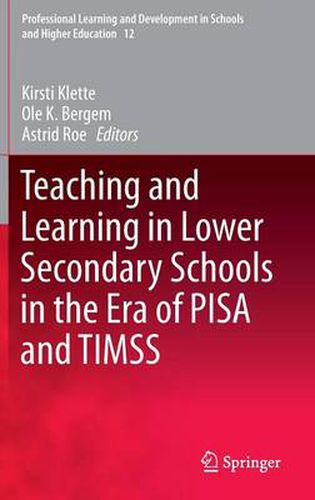Readings Newsletter
Become a Readings Member to make your shopping experience even easier.
Sign in or sign up for free!
You’re not far away from qualifying for FREE standard shipping within Australia
You’ve qualified for FREE standard shipping within Australia
The cart is loading…






This title is printed to order. This book may have been self-published. If so, we cannot guarantee the quality of the content. In the main most books will have gone through the editing process however some may not. We therefore suggest that you be aware of this before ordering this book. If in doubt check either the author or publisher’s details as we are unable to accept any returns unless they are faulty. Please contact us if you have any questions.
This book explores teaching and learning in lower secondary classrooms in the three PISA domains science, mathematics and reading. Based on extensive video documentation from science, math and reading classrooms in Norwegian secondary schooling, it analyzes how offered and experienced teaching and learning opportunities in these three subject areas support students’ learning. The in-depth investigations of video documentation are combined with analysis of the Norwegian PISA results in order to understand how teaching and learning in science, mathematics and reading can be improved.
Recent reviews indicate that instructional practice does make a difference to students learning - and is more important than other factors including students’ socioeconomic background, class size, classroom climate, and teachers’ experience and formal training. This book opens the discussion on a European basis about contemporary challenges in teaching and learning in secondary schooling. Norway as a test bed is particularly interesting due to its long tradition with national curricula, and its unitary and non- streamed structure. Furthermore, ideas of educational progressivism and students’ active ways of working (such as individualized teaching, adapted teaching, inquiry based teaching etc.) have for a long time been actively promoted within Norwegian educational policies.
The book draws on analyses that combine expertise in psychometrics and video-based micro genetic classroom studies with expertise in domain-specific instruction (math, science and reading). It feeds the conversation how issues of communication patterns are dealt with and made productive within different instructional formats, and presents possibilities to compare and analyze instructional formats and discursive practices for students’ learning.
$9.00 standard shipping within Australia
FREE standard shipping within Australia for orders over $100.00
Express & International shipping calculated at checkout
This title is printed to order. This book may have been self-published. If so, we cannot guarantee the quality of the content. In the main most books will have gone through the editing process however some may not. We therefore suggest that you be aware of this before ordering this book. If in doubt check either the author or publisher’s details as we are unable to accept any returns unless they are faulty. Please contact us if you have any questions.
This book explores teaching and learning in lower secondary classrooms in the three PISA domains science, mathematics and reading. Based on extensive video documentation from science, math and reading classrooms in Norwegian secondary schooling, it analyzes how offered and experienced teaching and learning opportunities in these three subject areas support students’ learning. The in-depth investigations of video documentation are combined with analysis of the Norwegian PISA results in order to understand how teaching and learning in science, mathematics and reading can be improved.
Recent reviews indicate that instructional practice does make a difference to students learning - and is more important than other factors including students’ socioeconomic background, class size, classroom climate, and teachers’ experience and formal training. This book opens the discussion on a European basis about contemporary challenges in teaching and learning in secondary schooling. Norway as a test bed is particularly interesting due to its long tradition with national curricula, and its unitary and non- streamed structure. Furthermore, ideas of educational progressivism and students’ active ways of working (such as individualized teaching, adapted teaching, inquiry based teaching etc.) have for a long time been actively promoted within Norwegian educational policies.
The book draws on analyses that combine expertise in psychometrics and video-based micro genetic classroom studies with expertise in domain-specific instruction (math, science and reading). It feeds the conversation how issues of communication patterns are dealt with and made productive within different instructional formats, and presents possibilities to compare and analyze instructional formats and discursive practices for students’ learning.